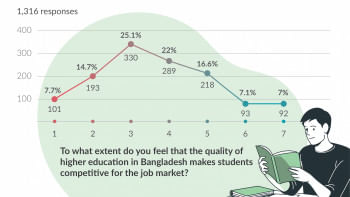Will our universities survive in 25 years?

Quality education is the backbone of a wholesome and prosperous society. But finding the "quality" in quality education continues to be elusive in Bangladesh. The "so called" universities (more like community colleges) are rife with social, economic, political and ideological problems that work against building learning organisations. Teachers, the kingpins, don the mantle of educators but have little to show in their academic profiles. For today's new generation of hungry learners, seeking to be actively engaged with illustrious minds, their classroom experience is simply frustrating, backdated, irrelevant, and unpalatable.
Hence the following student comment: "I don't know why I was present in the class; boredom was at its peak; teacher was not prepared for the class… Many teachers are toppers of their batches, but they cannot teach. After the first week, most students are lost in a black hole."
Where is the accountability? Teaching is not just about content and delivery; it is also about human interaction and connectivity, keeping an open mind, creating a positive ambiance, sharing perspective and skepticism, and maintaining a sense of humour – all interspersed with patience, commitment, flexibility, compassion, hope, and a great deal of creativity. The failure of academia to meet the needs of today's learners is already ushering in dramatic change.
For example, technology is changing the educational landscape. Imagine a day in the future when AI, robotics and corporate innovators will develop personal learning programmes (PLPs) catering to the individual learner. With corporate sponsorship, the PLPs will train and craft employees fitted to their needs. Computers will adapt to individual learning capacities, eliminating the competition for a GPA 5 that generally produces parrots! Will our universities be able to compete in this environment?
University degrees, providing little value, may in fact be on their way out. Today's learners are more interested in skills. Hence the emergence of Coursera, working with universities, offering MOOCs (massive open online courses) with certification programmes. Other similar organisations like Udemy, EdX, Udacity, Skillshare, MindValley, LinkedIn Learning, and Google platforms are fast evolving, seeking the sweet spot to cater better to different learner segments. Many are finding a Microsoft certification far more valuable and less costly than a local university degree.
The Internet is also opening up creative educational programmes abroad where learners see clear value addition. Why would they seek a local degree? With Google Classrooms to Zoom, MS Teams, Moodle, and much more, the opportunity to craft one's skills is now far greater. In fact, smart students abroad are already selecting courses and crafting their own majors aligned with their interests and changing global needs. In Bangladesh, once a student enters an academic track (a major), there is no way out: the student is literally trapped, even if she finds the subject remotely close to her interests. Our universities have still not found a way out for the "trapped" and "paying" student to pursue her dreams.
One can be fairly confident that the power of private enterprise will make alternate learning platforms stronger and far more creative in the days to come. Private bodies are already emerging to provide focused training in Bangladesh – training that the market demands but that our universities have failed to anticipate in making learning more useful and contextual.
Change is coming at us with increasing velocity. Where is the discussion on how these changes will affect our education system? How are we preparing our students for the imminent changes? The volatile, uncertain, complex and ambiguous future hurtling towards us appears to ruffle few academic feathers, secure in their unproductive "tenured" (guaranteed) positions.
We have already lost significant returns from Bangladesh's demographic dividend because of a poor education system. Substantive changes are needed here if we are to train, brain and unchain our learners. Unfortunately, a vested class of incompetent people who rule the roost in education revel in their power base but display a dearth of ideas and an unwillingness to confront and shape change, while the nation remains shackled. If this state of affairs continues, "outsourcing" the training of our youth will grow while our universities languish.
It is time for our education to become future-oriented by liberating our learners to go forth into the world with skills, confidence, imagination and enthusiasm. A "new education" – rising from a Schumpeterian creative destruction process – is in order for Bangladesh to explore the opportunities and meet the challenges that lie ahead. We need to think comprehensively and holistically to fix the education system and enable Bangladesh to attain its goals of a developed nation. Without quality, relevant and value-added education, I'm afraid, our education system will fade into obscurity.
The UGC and other educational bodies of influence ought to consider the imminent changes in their planning horizons and lead a conversation on "What will education look like in 25 years? How should we prepare for it? How can we make our students future-ready?" The proposal is not academic; it is imperative.
Syed Saad Andaleeb is former Vice Chancellor of BRAC University and Distinguished Professor Emeritus, Pennsylvania State University. He dwells on education and building human capacity. He can be reached at [email protected]

 For all latest news, follow The Daily Star's Google News channel.
For all latest news, follow The Daily Star's Google News channel. 






Comments